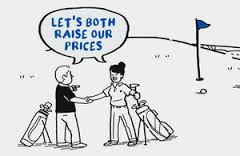According to the Black’s Law Dictionary, 8th edition, Competition is the struggle for commercial advantage; the effort or action of two or more commercial interests to obtain the same business from third parties. Whish and Bailey describe Competition as a struggle or contention for superiority, and in the commercial world, this means striving for the custom and business of the people in the marketplace
In the Nigerian telecommunication industry for instance, the major players include MTN, GLOBACOM, ETISALAT and AIRTEL. These aforementioned companies are competitors in the Nigerian telecom industry. Competition law in regard to these companies will seek to regulate the actions of these companies in their bid to gain market power and win consumers over.
Competition law consist of rules that are intended to protect the process of competition in order to maximize consumer welfare. In other words, competition law can be described as consisting of rules and regulations which oversee the conduct in which companies carry on business (Whish, Bailey 2012).
The major aim of competition law is to ensure a deep supply market for consumer goods and services, not just to ensure that there are many suppliers in the market for particular goods and services, but to ensure that such suppliers play according to a set of rules that would make it difficult for any of them, individually or as a group, to lessen or eliminate competition in the market
In Nigeria, there is no form of competition law in existence and this may make the concept strange to many readers, others may wonder why competition is relevant in the first place. In answering that question, please note that fair competition allows for open, equitable, and just competition between business competitors. Unfair competition on the other hand can lead to –
- Companies forming cartels and colluding to decide market pricing and production,
- Anti-competitive agreements, for instance, if all telecom agencies in Nigeria came together and jointly decided to offer their services for a certain price range thereby forcing the consumers to buy them.
- Abuse of dominant position, whereby a company uses its position as the dominant operator in the industry to force prices on consumers, for instance, recently consumers brought before the Consumer Protection Council, a case against Pay-Tv provider, DSTV, demanding that the council compels it to review its charges downwards. The CPC does not have such authority and this may allow DSTV increase its tariffs excessively knowing Nigerians will have to pay because there is no other Pay-Tv service provider competing with DSTV.
- Monopolization by an enterprise, and
- Anti-competitive mergers, for instance if MTN, GLOBACOM, AIRTEL and ETISALAT were to announce a merger, such action will be remove all form of competition in the telecom industry.
There is currently no law in the country solely dedicated to competition, even though it exists in some Acts, such as the Nigeria Communications Act. Although there exists a Price Control Act, this only serves to protect consumers of stable and essential items, like sugar, salt, milk, flour, matches, petroleum products, motor vehicles, motorcycles and bicycles’ with their spare parts (“Controlled Commodities”). The Price Control Act empowers the Price Control Board to fix the Controlled Price range for these essential items and makes it a criminal offence for any person to sell any of the listed Controlled Commodities above their approved controlled price[iv].
The National Assembly has been called upon severally to pass a Competition Law in Nigeria, but all efforts have proved abortive. Currently, there are several proposals for the Bill before the National Assembly and it is hoped that the 8th National Assembly will heed this national call and pass a law prohibiting anti-competition actions by companies.
At a time when Nigeria is currently undergoing a recession and earning power is diminishing among the vast populace, unscrupulous companies can find it ideal to collude and jointly levy on the Nigerian people, a price regime bothering on exploitative.

